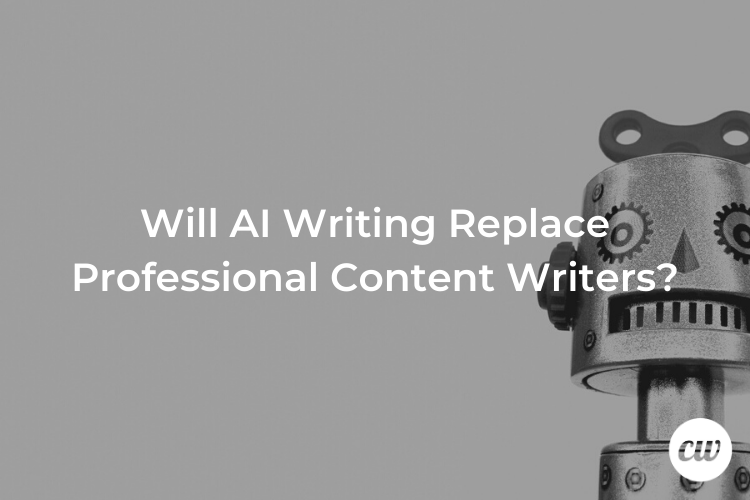
Will AI Writing Replace Professional Content Writers?
The idea that artificial intelligence (AI) or robots will take over our jobs is taking shape in some fields. As AI continues to become smarter, professionals across the globe are worried about whether AI can replace them. When it comes to AI writing, the pertinent question isn’t can AI replace human writers, but will it?
AI is already employed in writing, so we know that it can. Will AI replace professional content writers is a completely different question and one that requires a deeper look into the differences between a human writer and an AI writer.
What is AI or Artificial Intelligence?
Artificial intelligence, according to whatis.com, an encyclopedia of information technology, is “the simulation of human intelligence processes by machines, especially computer systems.” AI is a branch of computer science that builds smart machines using algorithms to perform tasks that usually require human intelligence.
The goal of using AI to accomplish tasks done by humans has given rise to much debate. While we accept helpful AI such as Siri, Alexa, Netflix movie recommendations, and customer service bots, there is heightened concern that AI will become so smart that it will replace writers in the workplace.
According to a recent report issued by the World Economic Forum, automation may displace up to 75 million jobs worldwide but it will also generate 133 million new ones by 2022.

How Does AI Write?
AI employs technologies called deep learning and natural language processing, using millions of existing writing samples in its database from which to pull. While deep learning tries to imitate the workings of the human brain in how it processes data and patterns, natural language processing attempts to analyze and generate language in a way humans use naturally. Together, the process is one where computers learn to read and understand the human language. AI programs learn word definitions and rules of grammar to structure sentences as humans do, following input from programmers about format, length of copy, and tone. From a technology point of view, the steps appear simple:
- The computer uses algorithms to collect and cull through data and find meaning in words.
- The data is then processed and converted into text.
From Science Fiction to Reality
AI writing programs can produce structured sentences the same way humans do by employing the formats, templates, and vocabulary they were programmed to learn, and they can produce faster than humans do. But that might be where the similarities end.
While science fiction writers have predicted for more than half a century that intelligent robots might overtake humanity, this reality is nowhere in the near future of professional content writers.
Stuart Russel and Peter Norvig, in the textbook, Artificial Intelligence: A Modern Approach, wrote that time hasn’t solved the difficulty of replicating the full set of cognitive abilities of the human brain.
In terms of writing, AI might have progressed enough to produce simple product copy for Ali Baba, or short sports pieces for the Associated Press, but cannot produce writings that require much more than a string of facts such as product features or game scores.
What AI Can Write
Some businesses in addition to Alibaba and the Associated Press do use and depend upon AI for some of their copy. Many of these uses still require a human touch. AI headline generators, plagiarism checkers, and grammar checkers are a few examples of how AI can aid human writers.
The automation of these types of tools allows writers to upskill and to concentrate their efforts on the parts of projects that call for creativity, subtlety, and fine targeting of messages. Content writers can more easily concentrate on the more fulfilling aspects of their work – ones that suit their talents better.
For those writers interested in following how AI is developing in their industry, take a look at AI writing products such as Persado, Quill, and Wordsmith.
Using Persado as an example, the product is said to have a way to mirror emotions in copy, but reviews of the product cite that headlines are formulaic and similar to many other headlines generated for both similar and dissimilar brands. There are also reports that while the tool creates useful subject lines, it also includes some that are “ridiculous.”

Why AI Writing Can’t Replace Professional Content Writers
The success of AI writing products such as Persado, Quill, and Wordsmith illustrates that AI has developed to a point where it is good at certain tasks. But, humans are good at things that AI cannot replicate like nuance, creativity, emotions, and empathy.
Humans are natural storytellers. It is in our soul. AI has no soul. AI can simulate intelligence. It can simulate language, but it cannot simulate expression.
In today’s market where consumers demand more personalization through the understanding of their needs and aspirations, how can AI fill that void between creating text and actually connecting emotionally with audiences? It cannot and will not for a long time to come. Through the complexities of human thought and emotion, human content writers far surpass AI in choosing just the right words that click with other humans. When every piece of content needs to help build relationships with customers, AI writing cannot compete with a real person who has emotions, experiences, and an understanding of the goals of the brand.
Using Alibaba as an example, you will find that the AI product descriptions are phrases of product features placed within a table. They don’t contain benefits or even full sentences that build desire in customers. Compare its “women’s leather envelope clutch wrist bag” with a bag description from Dooney & Burke, “Soft pleats, rolled top handles and a structured shape adds ladylike chic, while a divided interior with magnetic closures and a detachable strap adds casual convenience.”
The key difference between these two product descriptions is that the Dooney & Burke example demonstrates a clear understanding of who the buyer is and what will move that buyer to purchase. Professional content writers have the upper hand when it comes to tailoring copy to address buyer personas through empathy, experience, and instincts that an AI writer does not possess.
AI writers fall short on these capabilities:
- Understanding the nuances of tone. A sports blog would have a completely different tone than a women’s’ wellness blog.
- Choosing between compelling synonyms. A human writer will know whether to choose excited, animated, or exuberant among the many words in the English language that describe an enthusiastic feeling.
- Understanding audiences and personas. It takes a human writer to be able to communicate conversationally in a way that lets a customer know you understand them.
- Displaying authenticity. Creating content that differentiates your brand from all the rest takes subtlety and personality that AI writers just don’t have.
- Developing ideas. AI writers can organize facts and find the words to communicate them. It cannot take research and facts and further develop them into ideas.
The Future of AI Writers
Is the writing on the wall for professional content writers? Probably not. AI has been the next big thing for quite some time. It has had much more success in fields such as manufacturing and technology. For now, there isn’t any AI writer software sophisticated and creative enough to sound just like a human.
But humans do have limitations and AI writers can work in tandem with writers as an aid. Many writers already use AI aids such as Grammarly. But imagine AI that could do your research for writing a white paper, or fact check for you. These types of tools could be tremendous time-saving tools for writers.
Humans Still Rule The Content Writing Universe
For the foreseeable future, AI writers are best employed for scalability, fact-finding, and keyword churning. For a commodity brand such as Alibaba, AI writers provide the fastest route to tens of thousands of features-only product descriptions. But, as long as brands are more interested in building a unique identity and engaging their audiences, humans will remain the tool of choice.
Technology will certainly continue to develop, but it will never feel, have imagination or creativity, or understand the complexities of human emotion and relationships.
So, take a deep sigh of relief, content writers. Your future is secure. Writer and philosopher, Elbert Hubbard says it best, “One machine can do the work of 50 ordinary men. No machine can do the work of one extraordinary man.”
мфо взять займDeborah was the kid who would rather write book reports and essays than play ball during recess. Although she didn’t score many points with her peers, it did lead to her career creating content for TV, radio, print and new media for companies as varied as Dooney& Bourke, Panera Breads, Visa, SUNY Ulster and Hudson Valley Federal Savings Bank.
She is also a principal of small packages – a digital design company, and past partner/marketing director of whatis.com, the world’s foremost reference on information technology. And, her love of food enabled her to become a contributing editor of both Gourmet Retailer and Food Distribution Magazines.
Deborah has a bachelor degree in fine art from the Hartford Art School, University of Hartford and a masters in higher education administration from Stony Brook University. When she’s not writing, her love of quilting, furry animals, friends, and family sustains her.




